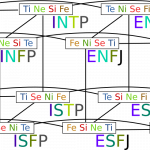MBTI is one of the most well known methods used in recruitment process. HR departments in a lot of businesses relies heavily on the results of MBTI tests; however, the problem starts to come into focus when the results don’t reflect the correct outcome , or at least gives wrong results due to incomplete/incorrect interpretation of data.
Is MBTI a theory?
MBTI is not a theory, it’s an indicator (Myers–Briggs Type Indicator) and it’s clearly stated in the indicator manual that it is designed to implement a theory; therefore, the theory must be understood to understand the MBTI.
How do the fake exams work? and why are these exams bad?
Exams are usually a bunch of two-choice kind of questions, each question tries to categories a person as either E or I, S or N, F or T, P or J. Each question gives a binary score to one of the 8 letters, and just one letter. Some better exams give a gradual score (-2 to +2) which are still not correct, so let’s assume that very famous question:
When you are in a party, you talk to strange people?
Very bad fake answers: YES (Extrovert), NO (Introvert)
Better-but-still-fake-answers: Always (Extrovert: +2 Points), Sometimes (Extrovert: +1 Point), neutral, rarely (Introvert: +1 Points), never (Introvert: +2 Points).
MBTI does NOT work by checking if you are Extrovert or Introvert and then checking if you are Intuitive or observant. MBTI is a methodology that DETECTS and ARRANGES your cognitive functions.
What are these cognitive functions?
Cognitive functions are the core of MBTI, each function is either active or passive. The more developed a function is, the more you can rely on (preferability).
| Function | I or E | Ordinary | Powerful | Dominant | |||||
| Gather information | Sensing | Extraverted (Se) | Basic usage of the 5 senses. | Enjoys tasty/beautiful/lovely experiences | ESTP/ESFP | ||||
| Introverted(Si) | Stick to personal beliefs | Ultimately stick to personal beliefs, the past is trustworthy and respectful | ISTJ/ISJF | ||||||
| Intuiting | Extraverted(Ne) | Find different solutions/point of views | Lots and lots of possibilities, an ocean of it! | ENTP/ENFP | |||||
| Introverted(Ni) | Some internal insights and understandings, a bit of instinct | Great instinct, Gut, “I know it but I don’t know how I know it” kind of perceiving. | INTJ/INFJ | ||||||
| Make Decision | Thinking | Extraverted(Te) | Follow guidelines/precise steps. | Can implement sophisticated plans. | ESTJ/ENTJ | ||||
| Introverted(Ti) | Understanding theories, principles and definitions. | Easily analyze the most suitable method to solve a problem. | ISTP/INTP | ||||||
| Feeling | Extraverted(Fe) | Tries to serve others’ needs and preferences. | Put the needs of others Before own. | ESJF/ENFJ | |||||
| Introverted(Fi) | Personal beliefs are important to some extent | Only do what aligns with the personal identity. | ISFP/INFP | ||||||
Check Key2Cognitive for more details
What difference does that make?
It makes all the difference, let’s take an example, simplifying the process of detecting an ISFJ to “I and S and F and J” is totally wrong and absolutely inaccurate. We can’t use a result (ISFJ) as a cause. The process is, as already mentioned, detecting and ordering cognitive functions, so you are ISFJ because you PREFER to perceive and act to different things based on Si, Fe, then Ti and finally Ne.
Let’s take one more step, the difference between ISFJ and ISFP is not as simple as Judging to Perception, that’s oversimplification. The first person has the four functions (Si, Fe, Ti, Ne), the other has (Fi, Se, Ni, Te). The order of the functions is dominant, auxiliary, tertiary and inferior. The difference is much more than you can imagine. For further understanding of the not-very-simple differences between not-so-similar types with one letter change at a time, take a look at the following image which will visualize the whole idea.
So, What’s you type? What’s the best MBTI test have you found online? How accurate was it? leave a comment and share your ideas.













0 Comments